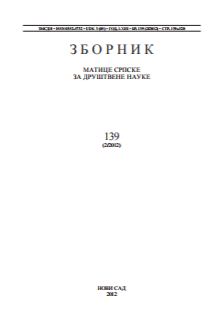ЕТНИЧКА ДИСТАНЦА / ВЕЗАНОСТ (БЛИСКОСТ) ВОЈВОЂАНСКИХ НЕМАЦА ПРЕМА СРБИМА И МАЂАРИМА У ВОЈВОДИНИ И НЕМЦИМА У СР НЕМАЧКОЈ НА ПОЧЕТКУ 21. ВЕКА
ETHNICAL DISTANCE/CONNECTION (CLOSENESS) OF GERMANS IN VOJVODINA ACCORDING TO THE SERB AND HUNGARIANS IN VOJVODINA AND GERMANS IN GERMANY AT THE BEGINNING OF 21TH CENTURY
Author(s): Aleksandar KrelSubject(s): Geography, Regional studies, Recent History (1900 till today), Inter-Ethnic Relations, Identity of Collectives
Published by: Матица српска
Keywords: Germans; Vojvodina; ethnical identity; ethnical distance/connection (closeness);
Summary/Abstract: Analysis one of the aspects, Germans in Vojvodina ethnical identity– ethnical distance/connection (closeness) to the members of the two most numerous ethnical communities in Vojvodina (Serbs and Hungarian) and Germans in Germany, their home country, bring us interesting results. It is talking about that numerous number of the examinees; based on the ethnical description, threat themselves more close to the Germans in home country then to the Serbs and Hungarian who live around them. Distance to the Serbs is more expressed to the colonists who have been moved In after Second World War and to the refugees and displaced people, who found asylum in Vojvodina, during nineties 20th century. To their neighbors, Hungarians, at the same time they express very contradictory feelings, closeness – because of the cultural preferences, numerous family’s connections and identical religious decisions and also there is a distance because of the need that they reconstruct and restaurate own identity.
Journal: Зборник Матице српске за друштвене науке
- Issue Year: 2012
- Issue No: 139
- Page Range: 197-207
- Page Count: 11
- Language: Serbian

